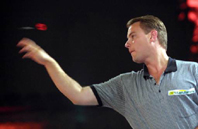PART'S DARTS FIVE

Canadian darter John Part turns his attention to pre-tournament preparations for installment five of his guide to practise.
Part's Darts Five: The Tournament Lead-Up
The time we find it easiest to motivate ourselves to practise is when we have a major competition on the horizon. Of course, we all procrastinate with various aspects of our lives, as we find we have less and less time to do everything we want to do.
So you suddenly realize that the big tournament is next weekend, and perhaps you have not practised as much as you should have. Panic sets in. Is it possible to whip yourself into top form in that short amount of time? Maybe not, but you can do things to give yourself the best chance possible for your competition.
If you have practised on a regular basis your confidence will be sky high. You will be very comfortable with your mechanics and you'll have a good idea of the skill level that you are playing at. If you have not practised as much as you would have liked to, you must not expect too much from your practise.
There is a danger of psyching yourself out. Expect to be below par and use those few remaining practise sessions to work as hard as you can at bringing your game up to par. Do not be distraught if in that first practise session you cannot finish well, or your scoring is inconsistent.
Patience is your most valuable asset when time is short. Have belief in yourself and your past efforts. Know that if you can display poise in adversity and persistence in practice, that you can turn your game around.
Practise prior to a tournament is a time for concentration on the things you are doing well, not to dwell on negative thoughts.
The structure of your practise routine should remain essentially the same for the few sessions before the big day. One change that can be quite helpful however, is to adapt the format of the upcoming competition for your own practise.
Still do the normal warm-up portion of your routine, but change the format at the heart of your routine, to reflect your upcoming event(as I discussed in the third article).
Keep the standard you are trying to play to very high (but still within reach). This will help make the real thing not seem so hard. While you should try your hardest to win in practise, it is winning the real thing that counts.
It is also a good idea to focus some extra time on finishing. Do some extra drills on your key doubles (whether you like them or not). I find it very helpful to work through the various finishes, so that they are all fresh in my mind when I come to play.
People tend to always want to practise "difficult" shots. In reality, it is the easy ones that you do not want to mess up. I start by finishing 2 left(in one turn), and then 3 left, and so on. It gives you a chance to think about shots we often overlook. For instance, with 17 left your first dart should be for 9.
If you go for a 1, an 18 or 20 that will cause you to bust, whereas if you miss 9 on either side you are still alive. There are many shots like this, and regularly practising so called "easy" shots will give a new awareness to the possibilities. I usually do every finish up to 100 and sometimes beyond. Once again, do not skip over the early numbers.
Prior to a tournament is also a good time to practise against a live opponent. This will give you a good feel for the pressures of competition (like the head games we can play with ourselves). Try to find someone who is a good match for your skill level. Playing against someone that rarely beats you will not test you against mental duress.
On the other hand, playing someone that you find very difficult to beat can destroy your confidence. It is also a good idea to play for something so as to get an honest effort out of both you and your opponent.
One last piece of advice. If you have practised a lot before an upcoming event, take a day away from darts the day before the event. In this way your arm will be fresh and strong.
Good luck
John Part.